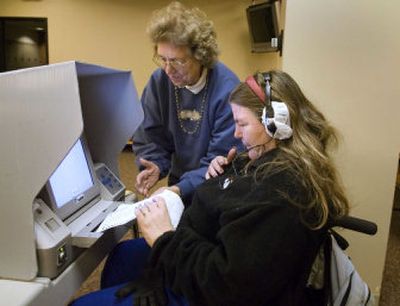New voting machines a hit

For years, Jan Richards has needed help to vote.
A 51-year-old Spokane woman who has multiple sclerosis, Richards has typically had her husband or poll workers help her read and fill out ballots. Unlike most voters, her ballot was never fully secret.
That changed Monday, when Richards voted on a system implemented to meet the requirements of a new federal law. The AutoMARK voting machine allows voters to listen through headphones to a computerized voice reading their ballot, and allows the use of touch screens, Braille buttons and other methods to make it easier for the disabled to vote on their own.
“I just thought it was going to be the same old thing,” Richards said, after casting her vote at Eastern Washington University. “But it wasn’t.”
Spokane County purchased 15 of the machines, using a federal grant to cover the $75,000 cost. The Help America Vote Act of 2002 required counties to provide such improved accessibility to voters nationwide. Spokane and King counties are paying special attention to how voters who use assistive devices, such as joysticks or puff-and-sip tubes to operate wheelchairs, can be connected to the system.
“This act and these machines send a societal message that disabled people are fully citizens of this country,” said Romel Mackelprang, director of the Center for Disability Studies and Universal Access at Eastern Washington University, which worked with the elections office to help select and deploy the machines. “Now, 15, 16 years after the Americans with Disabilities Act, we now have an opportunity for people with disabilities to be even more a part of the process.”
In Idaho, Kootenai County officials are dealing with many more of the machines, because voters still vote at the polls and federal law requires a machine at each of 65 polling places. The 80-pound machines can be an extra struggle for poll workers to move and set up.
“The typical little old poll worker is not going to be able to throw one in the trunk,” said Dan English, Kootenai County clerk.
The machines are helpful for people who have impairment to their vision or cognitive abilities, as well as anyone else who might struggle with any element of the voting process. Officials noted that people who suffer from arthritis might find the machines’ touch screens easier to use.
The machine reads ballots and displays them on a video screen and in a digitized voice through headphones. Once a voter makes all the selections, the machine marks the ballot and spits it back out, to be counted along with the rest of the ballots. No record of the vote is kept on the machine – not even a simple tally, officials said. That, plus the creation of a paper record, were among the reasons Spokane County officials chose this system, at a time when suspicion of computerized voting is high.
“One of the reasons we went to the AutoMARK system is because of the security issue,” said Paul Brandt, county elections manager. “It actually prints a ballot. You can’t have a better paper trail than a ballot.”
English said the machines were essentially an expensive pencil – they produce a marked ballot without any remaining data in the machine.
“They’re the same ballots anyone else uses, and they go in the same ballot can,” he said.
In Spokane County, the machines will be set up on Election Day at the five voting centers in the county, and officials have been trying to take them out to places such as retirement centers. During the primary and so far this election, use is light – a handful of voters showed up in the morning at EWU’s one-day use of the machine – but elections officials are still working to get out the word.
“Were they going to be an overnight success? No,” said Vicky Dalton, county auditor. “This is going to grow over the next year or two.”
But for many disabled voters, just the chance to cast an independent, private vote is an overnight success in itself.
Kevin Nathan, with the Washington State Department of Services for the Blind, used the system in the primary.
“It was the first time in 35 years of voting that I have been able to walk into the polling place, sign in and cast my vote with no one in the place knowing who I was voting for,” he said in an EWU news release. “It just felt wonderful.”
Richards, who uses a wheelchair, showed up at the EWU voting center Monday morning with her election choices already laid out in a notebook. After putting on the headphones and working through the ballot, she said she liked the experience, with one exception – the computerized voice. The voice is digital and jerky, and it also pronounced “Spokane” in out-of-towner-ese – Spo-cane.
“The voice on the thing has got to be changed,” she said.
Still, she liked the experience overall. After she got her ballot marked, she put it into an envelope and dropped it into the ballot box with one final word: “Amen.”